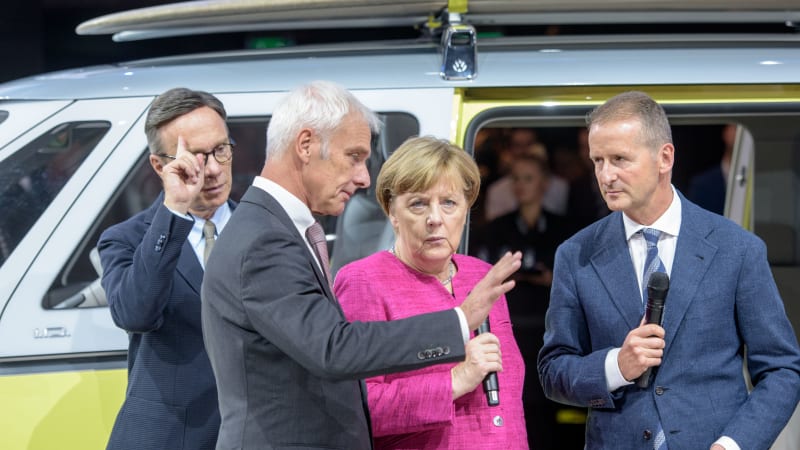AUTONEWS
Throughout 23 pages, all marked as "confidential", Volkswagen urges the German Government to implement a series of measures that will rapidly stimulate the transition to electric vehicles in the short term. This is at a time when the Wolfsburg manufacturer is about a year away from starting to market its new generation of battery-powered models, without which it will not be able to meet the redefined European standards that limit CO2 emissions, the ceiling to be more and more tight.
By 2021, manufacturers selling in Europe are required to have a range which, on average, does not emit more than 95 g / km of CO2, and are also required to have 30% of their electrified portfolio - to meet the new goals. But in 2030 the tightening will be even greater, as the European Union has decided that the new limits will be at 37.5% less then the values recorded in 2021. In this context, Volkswagen estimates (and assumed publicly) that within a decade, 40% of its sales should be represented by electric vehicles. In which, incidentally, he predicted an investment of 50 billion euros by 2025, just to ensure that he will have the batteries he needs.
In order to get the most out of this muscular investment as quickly as possible, Volkswagen sent a document to the German Government, which the Süddeutsche Zeitung had access to, entitled "Approaches and suggestions to improve the promotion of electric mobility in Germany". Where, basically, it not only asks for an unconditional support for electric vehicles, but also encourages the penalties for the remaining alternatives of locomotion.
One of the suggested measures is to change the fiscal framework so that only BEVs have access to benefits. To the point that even plug-in hybrids (PHEVs) are targeted, with the German brand proposing to the Government to halve the tax incentives that affect them, from € 3,000 to € 1,500, between 2020 and 2022. After that, "ball". That is, the electrified models - in which Volkswagen and Audi themselves are investing, let alone Mercedes and BMW, would lose any kind of state aid. What's more, Volkswagen suggests that taxes on these models should be equal to those applied to gasoline or diesel vehicles by 2023, while 100% electric cars would only pay half.
 Angela Merkel and Herbert Diess-CEO VW Group (on the right)
Everything for the trams, nothing for the others
Angela Merkel and Herbert Diess-CEO VW Group (on the right)
Everything for the trams, nothing for the othersThat appears to be the position of the German trade mark which, moreover, when confronted with the document to which the Süddeutsche Zeitung had access, did not deny its existence or its content.
For the builder of Wolfsburg, accelerating the transition to electric mobility implies having a heavy hand in anything that harms users of this type of vehicle. Thus, for example, it suggests heavy fines for those who park at recharging points, blocking access to the charging of electric vehicles. And to facilitate this operation, Volkswagen believes that it should be mandatory to have recharging points for batteries not only in service areas, but also in very busy places, such as supermarkets. And where would the money come from to support the expansion of the charging network? From a fund specifically set up for this purpose and to which the Government, the energy companies and the car manufacturers themselves would contribute. Volkswagen estimates that investment in the infrastructure should double to 600 million euros, predicting at the outset that only one type of plug, to unify the outlets.
Removing all barriers to the rapid approval of BEVs is another of the ideas explored in the document, along with an incentive scheme for their acquisition, based on the criterion of size: the smaller the better. Segments A and B would clearly benefit. First of all, because Volkswagen proposes that electric cars up to € 20,000 are entitled to electricity by the tassel. Then, because it suggests an incentive of € 5,000 for models up to 4 meters and 200 km and autonomy. With more than 4.65 meters, the state incentive should lower to € 2,000. which means that, at the head, all Tesla models are excluded from support. Also joining the trams of the three German premium brands (Audi, Mercedes and BMW), although these are also preparing models below for the entry segments.

Nenhum comentário:
Postar um comentário